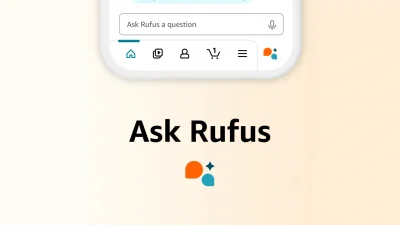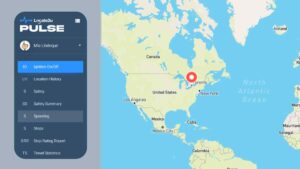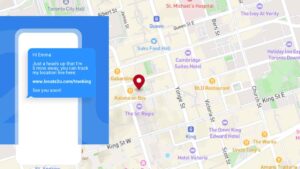Picture this: you’re browsing Amazon, looking for the perfect fitness gear, but you’re not quite sure what you need. In the past, these questions might have sent you down a rabbit hole of product reviews and comparison charts.
But now, Amazon has Rufus, your AI shopping buddy.
Think of Rufus as a knowledgeable, tireless, and infinitely patient sales associate, except his right at your fingertips, and can assist millions of customers at the same time.
Amazon designed Rufus – named after a real dog – to close the gap between the convenience of online shopping and the personalized in-store assistance you’d get from a salesperson in a brick-and-mortar store.
What is Amazon’s Rufus?
Amazon described its Rufus chatbot as an “expert shopping assistant trained on Amazon’s product catalog and information from across the web to answer customer questions.”
Rufus can talk to you about your shopping needs and Amazon’s products. It makes comparisons and recommendations based on context, and facilitates product discovery.
The beta version of Rufus launched in February this year, but only to a small subset of customers who use the Amazon mobile app.
As of September, Rufus is available to US customers, on both mobile app and desktop.
Fun fact: Rufus is named after a real dog – a former Amazon editor-in-chief and principal engineer’s beloved Corgi. The original Rufus was affectionately known as “Amazon’s shortest volunteer worker.”
Meetings didn’t bore him, and he was “a master of hallway tennis ball chase.” Rufus even received presents from Amazon shoppers, once they learned of the Amazon dog’s existence.
“His celebrity status never turned his head, though.”
The tech powering the Rufus chatbot
Trishul Chilimbi, vice president and distinguished scientist with Amazon Stores’ Foundational AI organization, says the generative AI assistant draws from impressive technologies.
Firstly, Rufus is a custom Large Language Model (LLM). But unlike most LLMs, Rufus was trained primarily on shopping data – including Amazon’s entire catalog.
The chatbot is also capable of Retrieval-Augmented Generation (RAG). This means it can access information beyond its training data. Rufus can learn from other external sources, and then answer customer queries more accurately.
Thanks to its reinforcement learning capabilities, the AI assistant never stops learning. It’s been programmed to improve itself continuously.
How? By analyzing customer feedback and learning which responses are most helpful.
Chilimbi explains that “customers can be the best source” for reinforcement learning. In fact, Amazon encourages customers to give Rufus feedback on whether they liked or disliked answers.
Finally, Rufus is equipped with advanced hardware – Amazon’s proprietary AI chips (Trainium and Inferentia), and streaming architecture.
The chips enable Rufus to serve millions of customers all at the same time, while its streaming architecture enables customers to receive answers in real-time, as Rufus generates them.
How Rufus helps Amazon customers
According to the retail giant, customers already asked Rufus “tens of millions of questions” and the feedback seems overwhelmingly positive.
1. Understanding products
Meanwhile, customers say Rufus helps them to understand product details. The chatbot gets its information from perusing product listing details, customer reviews, and community Q&As.
Some of the most popular questions include ‘Is this [appliance] easy to clean and maintain?’ or ‘Is this mascara a clean beauty product?’
Beyond just answering questions, Rufus also provides a “related questions” section in the chat. From here, customers can see additional information about that product.

2. Comparing options and providing updates
Customers often want to shop based on the latest products and trends. Or perhaps they’d like to know the difference between gas and wood fired pizza ovens.
Aspiring runners might want to better understand the difference between trail shoes and running shoes. Rufus can also draw from the latest trends, if someone wants to know about, say, the latest ‘denim trends for women.’
Rufus also answers questions that are not obviously related to shopping, for example: “What do I need to make a soufflé?” or “What do I need for a summer party?”
In this regard, Amazon might be giving Google its money as an AI-powered search engine.
3. Getting product recommendations
Rufus also assists customers in getting product recommendations based on the specific features they require.
The Amazon team says: “One customer recently said they asked Rufus about a pool umbrella recommendation for Florida, and Rufus shared facts about Florida’s weather, humidity, and suggested umbrella features.”
Regardless of whether they ask broad questions (What are the best wireless outdoor speakers?) or something more specific (What are the best lawn games for kids birthday parties?), Rufus has thus far provided “high-quality, informative answers that help them make a product selection.”
About the author
Cheryl has contributed to various international publications, with a fervor for data and technology. She explores the intersection of emerging tech trends with logistics, focusing on how digital innovations are reshaping industries on a global scale. When she's not dissecting the latest developments in AI-driven innovation and digital solutions, Cheryl can be found gaming, kickboxing, or navigating the novel niches of consumer gadgetry.













